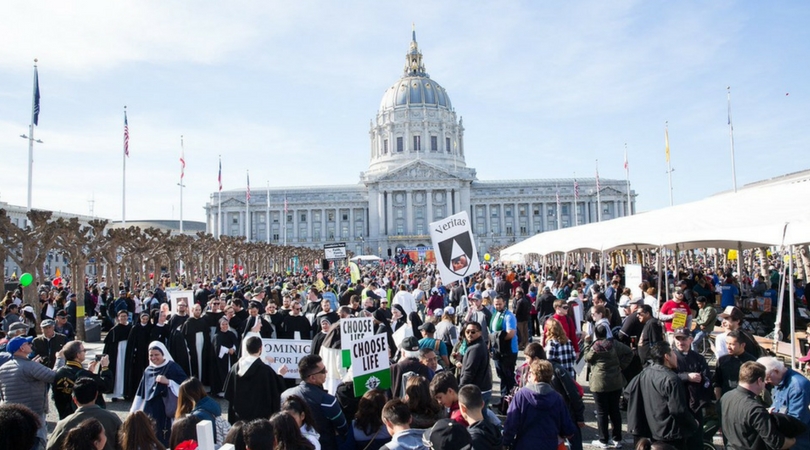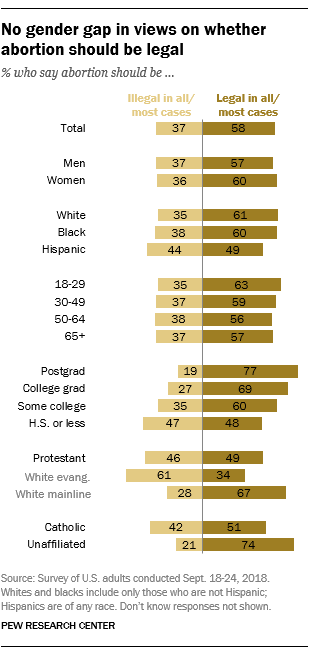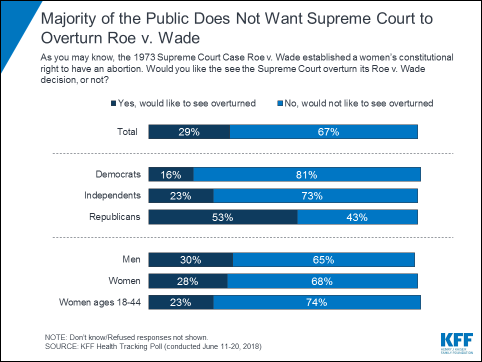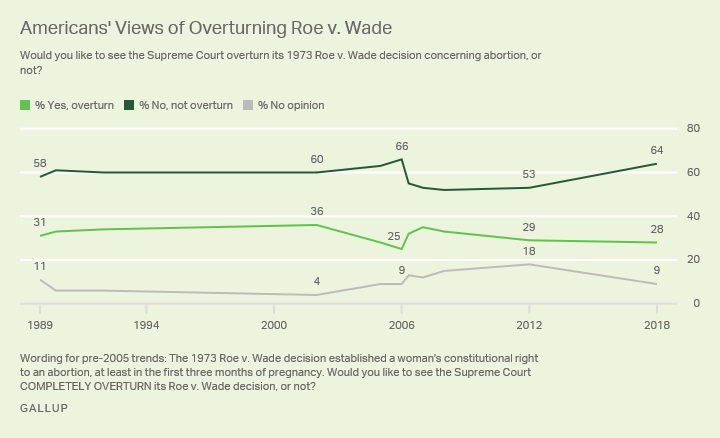Are Pro-Life Views Resurging Among Millennials?

Today I came across a video in my Facebook feed from Live Action, a page that describes itself as a nonprofit dedicated to exposing the human rights abuses of the “abortion industry.” The video features an interview with conservative personality Allie Stuckey. Known as “The Conservative Millennial,” you may know her from her partnership with CRTV and her vlogs in which she rails against everything from the “liberal indoctrination rampant on college campuses” to “safe-space culture.”
I dropped a comment, both on Live Action’s page as well as on the post from the friend who shared it, questioning one of the claims made in the interview. It now appears that those comments were deleted within the span of two minutes. Whenever this happens, I first tend to assume it is user error on my part rather than draconian measures by those challenged on the facts.
Alas, instincts can be naïve. I’m afraid this instance was yet another lesson in how conservative echo chambers operate. The cleansing of opposing voices and the unhealthy aversion to facts is a hallmark of evangelical conservative websites and social media pages. Such bald-faced attempts at manufacturing consensus are endemic in these circles, and for what it’s worth, I have not observed these patterns on left-leaning media.
In the interest of full disclosure, I have a number of friends in common with the person running this interview, who I can only assume is the one who deleted my comments. Since my comments are no longer visible, I’ll take a moment here to respond in some detail because I think this is important — and because facts matter.
Around the 1:40 mark, Alison Centofonte states, “millennials are becoming more pro-life. We see that in statistics and studies.”
We are? This is not something you typically hear asserted, as it’s fairly common knowledge these days that millennials lean disproportionately left, and pro-choice is a predominant view on the left. And indeed, the most predictive factor when it comes to determining one’s position on abortion is age, with the upcoming generations more likely to identify with the pro-choice position.
I am unable to find any evidence at all to support Centofonte’s statement. Pew, Gallup, Kaiser, Quinnipiac, Reuters, and Politico polling results are consistent in finding that not only do an overwhelming majority of Americans think access to abortion should not be outlawed, but that younger respondents, especially college graduates, are more supportive of abortion rights in general.
In a report released just last week, Pew found that “nearly six-in-ten Americans [58%] say abortion should be legal in all or most cases.” Only 37% think it should be illegal in all or most cases. More to the point, they found that as age decreases, support for legal access to abortion grew, with 63% of 18-29 year-olds supporting it (fact sheet here).
How about Quinnipiac? Their 2017 poll found a slightly higher figure — 60% who think abortion should be legal in all or most cases — with nearly identical correlations between age, education level, and favoring the right to abortion.
Later in the interview, the topic of Roe v. Wade comes up, inevitably. Now there’s an important distinction to be made here between one’s personal or privately held views on the morality of abortion on the one hand and upholding the letter of the law and other women’s right to choose on the other.
It’s no different from the same-sex marriage issue in this regard. Many respondents, for example, will oppose same-sex relationships on moral or religious grounds but support the effective legalization of same-sex marriage in the wake of the Obergefell ruling because they recognize that not everyone holds to the same religious precepts that they do. It is the job of pollsters to tease out such niceties in the data by asking the right questions.
While some commentators fail to honor this distinction in their reporting of polling results, these are separate questions that can yield measurably different polling outcomes depending on how they are asked. As The Washington Post details in a recent article, support for upholding Roe v. Wade tends to outpace support for abortion more broadly, with a difference of as much as 10 percentage points.
What we can say fairly definitively, however, is that we find the strongest support both for the right to legal abortion as well as the safeguarding of Roe v. Wade among the millennial generation. The Kaiser poll published this year found that two-thirds (67%) of Americans are against Roe v. Wade being overturned. That figure swells to 74% for women ages 18-44.
Quinnipiac’s poll found that 63% of Americans agreed with the Roe v. Wade decision. This particular poll found a consistent spread among all age groups on this question.
Pew reached a similar verdict in a 2016 poll, with seven in ten (69%) Americans agreeing that Roe v. Wade should remain in place. When they compared their December 2016 results to those of Gallup from 1992, they further found that support for Roe v. Wade had grown from 60% in 1992 to 69% in 2016. When filtering by age, Pew’s study found a 73/24% split for Americans ages 18-44 who oppose overturning Roe v. Wade, and a 64/33% split among those ages 50 and over.
Finally, Gallup’s poll, taken shortly before Brett Kavanaugh was announced as Trump’s Supreme Court nominee, found that 64% of Americans support Roe v. Wade and do not want it overturned. This is up from 58% in 1989, the earliest that Gallup data is available. Gallup, at least in their press releases, do not sort their results by age demographic, but we can safely assume their findings track with those of other polling firms given their consistency on most other metrics.
Overall, I found the video’s claim curious particularly because views on abortion among the American public have been relatively stable over the last few decades, especially compared to other hot button issues like climate change and same-sex marriage. If anything, the trend is toward greater acceptance of abortion, primarily due to millennials and younger people supporting a woman’s right to choose. In reality, the only aspect of the conversation that’s changed is the partisan divide, which has broadened significantly in the past two decades, and this is part and parcel of the society-wide polarization and sorting effects that we’ve observed during this period.
Lastly, we’d be remiss in closing this post without mentioning that abortion rates are right now at an historic low in the US at 14.6 per 1,000 — the lowest, in fact, since Roe v. Wade was passed back in 1973. As NPR notes, this is in large part thanks to improved access to contraception under the ACA, the increased use of IUDs, and more effective family planning programs around the country, the confluence of which has resulted in reductions of unintended pregnancies and teen pregnancies in particular. That’s a positive data point no matter which “side” of this debate you’re on.
Of course, none of this is meant to address the underlying arguments on both sides of the abortion question. It is simply meant to address the video’s suggestion that there’s a pro-life resurgence among young people. I do not find this claim in evidence.
Further reading:





Comments